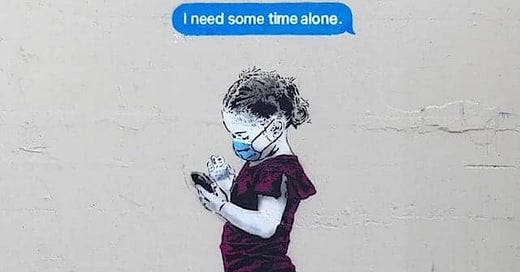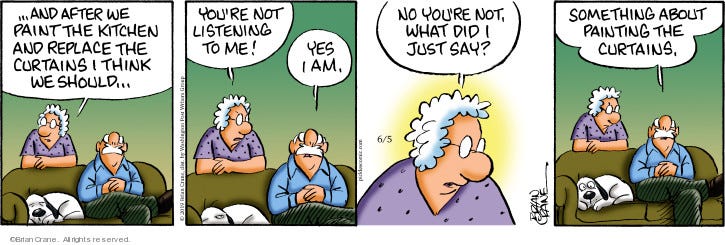Welcome to Wait! Just Listen, a digitally handcrafted newsletter on the seemingly mundane, inconspicuous and yet defining stories nestled within our online communities. If you enjoy my musings, please subscribe for a regular dose of freshly penned thoughts. I respond to all emails and comments.
Epictetus, the Greek Stoic philosopher, was perhaps not referring to social media when he said, "We have two ears and one mouth so that we can listen twice as much as we speak”, but his words have a heightened resonance in a digital age that has romanticised the notion of expressing yourself. But having a voice is only one part of the equation. For all the democratising potential the Internet offers, it isn’t a remarkably great showcase for listening. Sure, you could vent about your challenging day at work in 280 characters or less and attract a barrage of sympathetic replies - some genuine and others possibly a tad snarky (trolls have to survive somehow). While such instances provide you with the fleetingly cathartic comfort of being listened to, these moments rarely evolve into robust and considered exchanges or revelatory sessions of empathetic listening. I’m not talking about hour-long sob-alongs and an outpouring of feelings. Just a basic and heartfelt human interest in what is being told to us.
The biggest stumbling block to achieving my (and potentially other people’s) idealised vision for listening on social media is space. As I mentioned before, you can’t summarise much in 280 characters or in a 320 pixel by 320 pixel image. But therein lies the problem. By and large, internet platforms by virtue of their programming and design, reward the practice of speaking rather than listening.
Likes, comments, hashtags, subscribe buttons, shares, upvotes and downvotes. What do they have in common? They each in their own characterfully unique way, incentivise speaking. Forget the monetary motivations for a second. If you post a tweet or an Instagram picture, there is a high possibility of it receiving some form of acknowledgement through at least one of a myriad of avenues. There is an explicit reward for your efforts - a quick dopamine hit and a virtual pat on the back.
The visibility of your post, photo and/or video is directly based on the number of likes/reactions it attracts - the higher the number the happier the algorithms are to promote your content just that extra bit more leading to more reach and higher engagement numbers. But how do you reward a largely intangible activity like listening or should there even be a reward system in the first place?
To put in a different way, how often have you received a reply that legitimately (and rationally) considers the contexts and content of your message/tweet/post? Various independent studies in neurological science have identified skim reading as the new literacy of the digital age when it comes to text-based media. This involves a quick and cursory glance for key buzz words just to get a gist of tweet or post. In other words, we don’t have time to grasp complexity, to understand another’s feelings and to reflect on the intention of a specific digital creation. There is little if any impulse for critical analysis, empathy and other deep reading processes.
Even worse, people don’t necessarily expect to be fully listened to (in a traditional sense) when posting on social media. If your post or comment rakes in the appropriate metric of likes (whatever that may be), you’ve hit the jackpot in the popularity stakes. You’ve mastered the art of capturing/arresting public attention for that inkling of a moment even if (rather ironically) no actual listening takes place.
Further to the above, in an ideologically polarised world, compromise, restrain and acceptance remain the exception rather than the norm. Social platforms are conducive sites for showcasing partisan tribalism, defining ‘otherness’ and group difference. Such environments are ideological echo chambers rather than forums for cognitive and opinion diversity. The predominance of hyper-partisan online communities and their collective suspicion against differing schools of thought have contributed to an age of endless bickering and umbrage.
The rise of social media influencers or the more scholastic variant, “thought leaders”, have destroyed all hope of an egalitarian playing field. Social platforms are typically emblematic of the disproportionate power held by a tiny minority. Those with more expansive networks eventually develop a following online, while other ‘less fortunate’ souls have a choice of joining in on one of these mainstream bandwagons as a participant-follower or missing out altogether. Nonetheless, the driving motivation (whichever side you’re on) is to seek and win public acknowledgement and attention. Listening remains a distant second because the architecture of social media engagement (both technical and social) does not require it.
In an effort to finesse my observations on social media with empirical evidence, I posed the following question on Reddit’s, ‘Theory of Reddit’ channel: Do you feel you are being listened to on social media? I received over 100 responses and ran them through a concordance analysis software to identify key themes in the conversation. Overwhelmingly, 85% of responses argued that listening wasn’t the aim or priority of social media. Here are few noteworthy responses:
“If I wanted to show someone I’m truly listening, I’d be speaking to that person on the phone not online. We all know that social platforms prioritise those who shout the loudest….it is an environment that is overtly exhibitionistic. It’s all about those upvotes and karma points man.“ “…I listen at home to my wife. I listen to my boss. I consider my replies to various colleagues at my company. Social media is meant as a reprieve. I want to scroll and not think. I want to see what I want to see and what makes me happy with a cold beer in the other hand.“ “Sure, I give a vague acknowledgement if I’m replying to someone’s post that I’ve looked at it, but I mean at the end of the day if my reply doesn’t fit with OP’s (original poster) thoughts, it is gonna get downvoted anyway and nobody will see it.“ “Your'e (sic) aware you are asking this question on reddit right? Like its the one place on the Internet where people post before they think (not always but mostly)... it's all about harvesting those upvotes.“ “what a f***ing dumb question“ Social media is a digital soap box for most - it offers a space for self-expression either under a veil of anonymity or through a meticulously crafted identity that you feel most comfortable with. At its rawest core, social media engagement is ultimately about constructing a presence and voice for receiving validation and capturing a slice of attention. There is nothing fundamentally wrong with revelling in the limelight or welcoming public endorsement but it is, for want of a better phrase, a lop-sided system of interaction. The only currency that truly holds value or some form of sanctity is visibility. Not the perception, experience or contexts surrounding the person/people or subject(s) you are talking to or about. You are the superstar as long as you have the mic and are seen holding it.
Am I being unduly unfair and pessimistic in my dooms-day assessment of social media’s impact on listening processes? Probably. But the truth of the matter is that the lure of being able to own that 15 mins of fame through a clever tweet, a provocative picture or even a ludicrous meme, outweighs any possibility or obligation to listen. There is nothing in it for the understated listener, because it is too much work for too little reward. In an uncanny digital twist to Pavlov’s classical conditioning model, we have been programmed to create content for reward and recognition (i.e. likes/upvotes). It is a system that makes the most economic sense for advertisers and other neo-liberal advocates. Compounding this bleak outlook is the fact that most online interactions are governed by the unknowable whims of algorithms.
The ability to have your say is widely perceived as a basic human right in any functioning and legitimate democracy. You would be hard-pressed to find ‘the right to listen’ enshrined in any constitution. There is a certain absurdity in the claim that people aren’t allowed to listen - unless when referring to explicit forms of media censorship. Yet we’ve unwittingly censored ourselves by creating and participating in a digital ecosystem that thrives on ceaseless babbling and noise, stifling any opportunity for purposeful listening. This is because the expression of voice (and noice) is the single most accessible way to garnering audience engagement - the clicks, likes, shares, the whole shebang. Voices can be disruptive, inspiring, ambitions, rambunctious and more importantly they have the potential to jolt you at the right moments amidst all that mindless scrolling. Listening, on the other hand, remains shrouded in obscurity, a non-entity without any commercial heft.
It doesn’t have to be like this. We’ve seen powerful instances of mass online activism and advocacy - movements that by their very nature are predicated on listening, empathy, action and a well-intentioned willingness to make a difference to the lives of others. Perhaps it is time for that energy, vigour and ambition to funnel through into the everyday granular interactions we have on social media platforms. This could potentially be synthesised as an awareness movement or a social enterprise if you like to promote more compassionate and human centric listening-based approaches and standards to online communication. I’m envisioning this in a similar way to how we’ve formulated responsible and accessible web standards to design and coding to ensure a universal baseline compliance and standard. There is nothing to stop us from applying a similar framework to social media conversations too, especially in specific niche groups where deliberation and engagement are seen as cornerstones to healthy debate.
It is high time that our fanatical compulsion to share and speak is matched by an equal desirability to connect, empathise and relate openly. It is time for listening to take centre stage. I’m sure Epictetus would approve.
Have you encountered any positive online experiences where you felt you were genuinely listened to? If you have, please get in touch either in the comments section or via email on your experience, for a larger essay I am currently working on around the dynamics of social media listening.
Interesting Reads on the Interwebs
The media love giving racists a platform
A no-holds barred account on the predominance of media fuelled racism in the seemingly idyllic shores of New Zealand. The honesty in David Ferrier’s writing is laudable as it is refreshing.
A humorous and candidly penned account on the farcical nature of extreme detoxing by Suzanne Moore. Carrots anyone?
Shakespeare & Co's Tumbleweeds & Community vs Audience
A deeply insightful exploration by David Litwak into a novel community-building program launched by a Parisian bookstore. ‘Tumbleweeds’ is a program that invites loyal patrons/members/supporters to literally spend a night in the bookstore contributing to its upkeep and writing about their experiences.
Thomas J Bevin beautifully captures the unique mindful essence in cats and what we can learn from these loveable felines, particularly in regards to our relationship with time and its various conceptions.
This is a poignant review of the movie Shin Godzilla by Connor Wroe Southard. The beauty of this piece lies in how Connor seamlessly paints a meta-narrative on cultural attitudes, bureaucratic perceptions and social misconceptions, over what is a seemingly mainstream Godzilla instalment.




